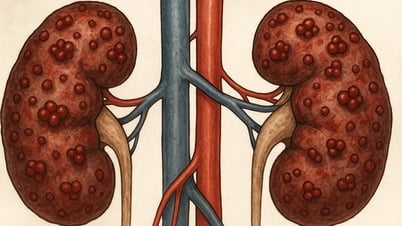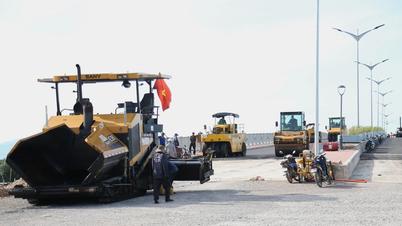In addition to lifestyle factors, genetics also increases the risk of prostate cancer. Research shows that people whose father or brother has prostate cancer are 2 to 3 times more likely to develop the disease than normal people, according to the health website Healthline (USA).
Prolonged back and hip pain can be a warning sign of prostate cancer in men - ILLUSTRATION PHOTO: AI
Early symptoms of prostate cancer often progress silently, easily confused with normal physiological signs of aging or diseases such as prostatitis or benign prostatic hyperplasia. Latent symptoms, easily confused with other diseases of prostate cancer include:
Frequent urination can be a warning sign of prostate cancer that you should not ignore.
Many middle-aged men are prone to waking up in the middle of the night to urinate. This condition occurs more and more frequently, sometimes accompanied by frequent urination and difficulty urinating. This is common, often thought to be a result of aging. However, it can also be an early sign of prostate cancer.
The prostate gland surrounds the urethra. Therefore, when a tumor grows, whether benign or malignant, it can compress the urethra, leading to urinary disorders.
Erectile dysfunction
Erectile dysfunction is often attributed to stress, age or psychological factors. However, prostate cancer also affects male sexual function.
Tumors can damage the nerves or blood vessels responsible for controlling erections. Additionally, anxiety and hormonal changes associated with cancer can also contribute to decreased sexual desire and ability.
Persistent back, hip, or pelvic pain
Many people think that a dull ache in the lower back or pelvis is caused by sitting too much, poor posture, or a spinal problem. But in some cases, it is a sign that prostate cancer has spread to the bones. The pain will be worse at night or when moving.
Blood in urine, semen
The appearance of blood in urine or semen is easy to ignore or think of as a urinary tract infection. However, this is one of the important warning signs of prostate cancer. If the blood in the urine is persistent or recurring, you should see a doctor as soon as possible, according to Healthline.
Source: https://thanhnien.vn/ung-thu-tuyen-tien-liet-4-trieu-chung-de-bi-nham-la-benh-khac-185250706004637992.htm




![[Photo] Hanoi: Authorities work hard to overcome the effects of heavy rain](https://vphoto.vietnam.vn/thumb/1200x675/vietnam/resource/IMAGE/2025/8/26/380f98ee36a34e62a9b7894b020112a8)




![[Photo] Multi-colored cultural space at the Exhibition "80 years of the journey of Independence - Freedom - Happiness"](https://vphoto.vietnam.vn/thumb/1200x675/vietnam/resource/IMAGE/2025/8/26/fe69de34803e4ac1bf88ce49813d95d8)












































































![[Podcast] - Decoding Danang University's 2025 admission scores](https://vphoto.vietnam.vn/thumb/402x226/vietnam/resource/IMAGE/2025/8/26/c89fdb410fec44479fd37acd9fd76093)






















Comment (0)